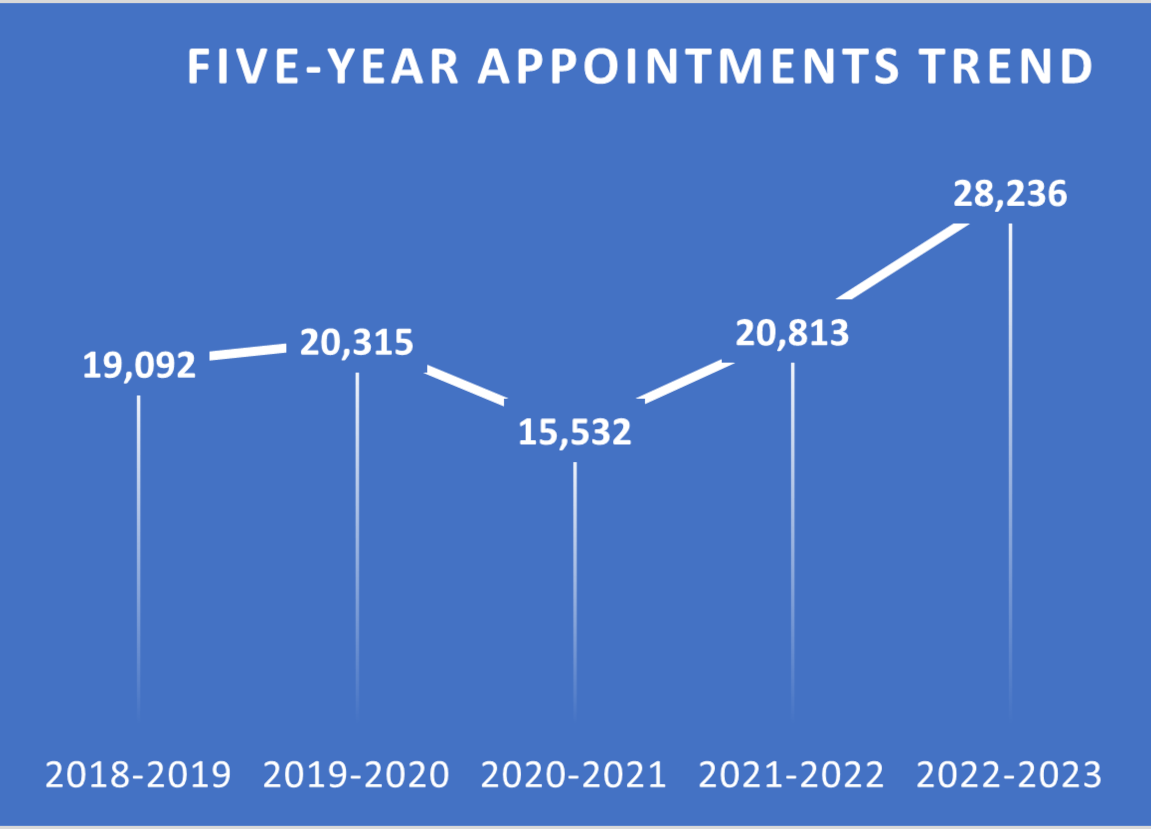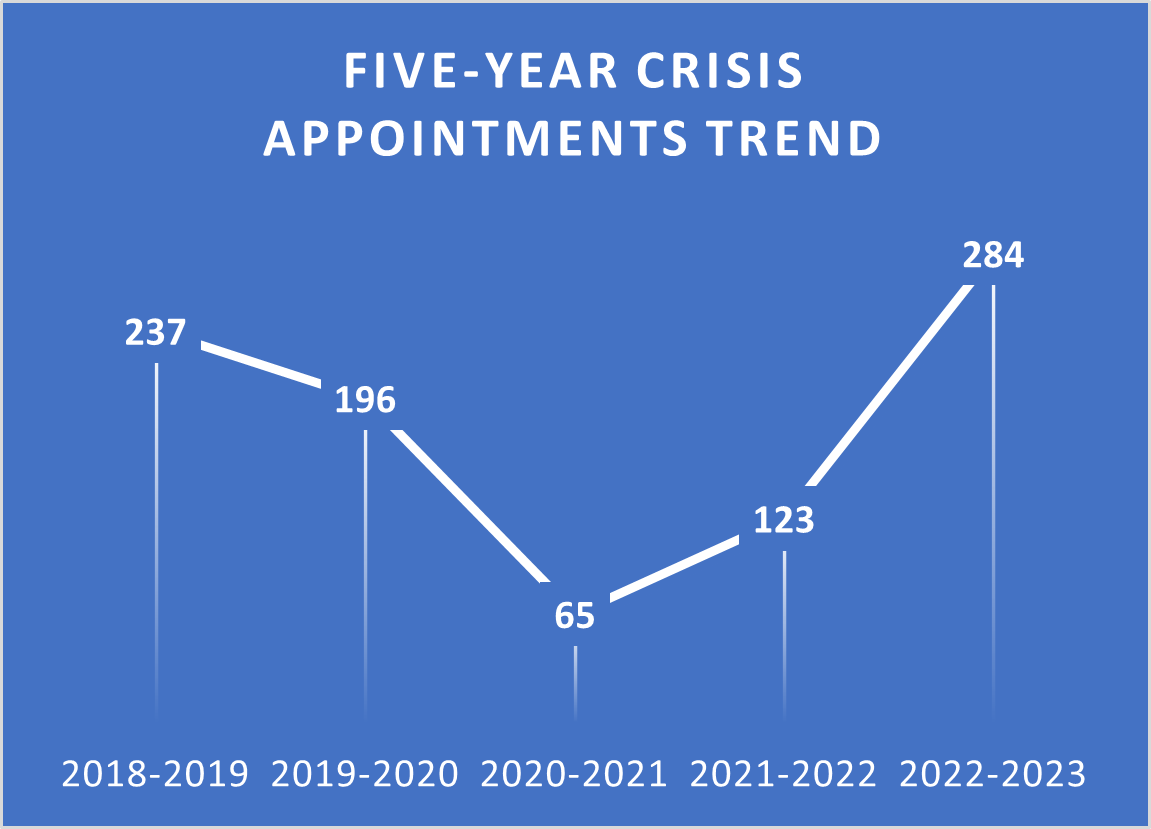Student Health & Counseling Services
About 75% of lifetime mental health problems will onset by the mid-20s, so that means that the college years are a very epidemiologically vulnerable time.
A 2022 survey by Gallup and the Lumina Foundation shows that 2 out of 5 undergraduate students say they frequently experience emotional stress while attending college. In the UofM 2021 Healthy Mind Survey, 56.8% of the students responded to the survey reported that worries get in the way of their success.
Now students are facing the added stress of a rapidly increasing cost of living and economic uncertainty. According to the Journal of College Student Psychotherapy, recessions lead to poor mental health outcomes, especially for students. And we know that students from minority and disadvantaged populations are more likely to suffer from the effects of a struggling economy. In fact, 78.4% of the students seeking services at UofM Counseling Center indicated having significant financial distress.
But you can help. A gift to Student Health and Counseling Services will make a real difference for a student—ensuring their bright minds and innovative solutions can make a difference for the world.
With your support, SHCS provides physical and mental health care to help students cope. This includes individual and couples counseling, group sessions, access to licensed psychologists, licensed clinical social workers, licensed mental health counselor, psychiatric nurse practitioner, general family nurse practitioners, registered nurses, case manager, and a mental health team as well as outreach and educational programs to create a healthy campus community.
In addition, you will help provide a wide array of programming that connects students with experts, peers, and supportive communities. It’s so important to make sure students are supported by those who have similar lived-experiences and shared identities.
The University of Memphis Trauma Support Program
NEED FOR SUPPORT
Many students endure traumatic experiences that profoundly impact their mental and emotional well-being, yet they often lack the resources and support needed to navigate these challenges. Without access to counseling, therapy, and other specialized services, these students may struggle in silence, preventing them from reaching their full potential.
Somatic-based interventions for the mind and body
To support students who have experienced trauma, the University of Memphis Counseling Center has established a dedicated in-house trauma support program. Through financial support from the state of Tennessee, we now offer specialized somatic-based interventions that focus on fostering healing, reducing trauma-related symptoms, and equipping students with the tools to cultivate resilience and achieve their academic and personal goals.
IMPACT
Since the program was implemented, we've seen a 66% reduction in psychological symptoms and a 52% decrease in physical symptoms related to trauma. These promising results demonstrate the immediate success of the program and underscore the urgent need for its expansion.
HOW YOU CAN HELP
The State of Tennessee has made this essential trauma support program possible. However, as the need for these services continues to rise, we invite the Tiger community to help us extend this vital support. Your sponsorship of counseling services will have a direct and lasting impact, ensuring that no student faces trauma alone.
Whether you donate $1 or any amount that feels right, your contribution provides students with the support they need to heal, grow, and thrive. Your gift can help them overcome trauma, navigate mental health challenges, and build a brighter future. With your support, students gain access to crucial resources that empower them to succeed both academically and emotionally, ultimately shaping the leaders of tomorrow.
“I’ve always heard EMDR but I never had the opportunity to experience it because of the cost and finding a therapist to fit with my schedule. Thank you so much for this opportunity” - University of Memphis Student
"I have been going to therapy for years and have not been able to process what l experienced as a child. I finally feel like I don't need therapy for the rest of my life. This has been a Godsend,” - University of Memphis Student
"There has been no waitlist or confusion from our students. They have been excited about the quick availability and scheduling of this program. It makes a big difference. Our referral partners do not have openings for up to 3 months,” - University of Memphis Counseling Center Director
Snapshot of Counseling Center current appointments


Student Outcomes
Comparison with national data (August 1, 2022-July 31, 2023)
- Effectiveness in reducing client's depression, social anxiety, and eating concerns: top 15%
- Effectiveness in reducing clients' academic distress: top 15%
- Effectiveness in reducing client's overall distress index: top 15% in the nation
Feedback and evaluations of our prevention workshops
- 97% indicated they benefited from the workshop and would likely use what they learned from the workshop
- 99.6% indicated that after the workshop, they would start or continue to engage with or refer to Student Health and Counseling Services
Donation Impact
Your gift to UofM’s Health & Counseling Services Development Fund will make a direct impact in students’ lives. You will be helping someone who might be struggling with anxiety, depression, or financial stress—by supporting services that have been proven to make a difference.
We have seen more and more students seeking support post-pandemic. Anxiety, depression, and PTSD are the three most common issues being seen at the Counseling Center. Due to the demand, waiting times for an appointment are growing. That is why a gift from donors like you can make such a difference. Not only are you helping SHCS to provide free counseling, prevention, support services, and other interventions—you are showing students that they are not alone and there is a community out there that cares for them and wants to help them succeed.
Now, more than ever, it is vitally important that students can receive free and convenient help—wherever they are, whenever they need it. Please give today.
